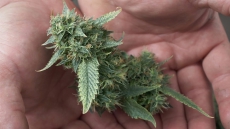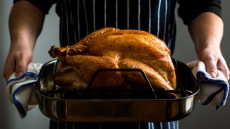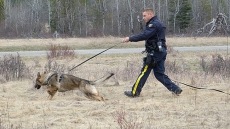TORONTO — As if autism wasn't already enough of a puzzle, researchers have discovered that even siblings affected by the disorder often don't share the same genetic mutations that appear to underlie their symptoms.
In a Canadian-led international study of 85 families with two children affected by autism spectrum disorder (ASD), researchers found that almost 70 per cent of the sibling pairs carried different genetic mutations related to the neurodevelopmental condition.
The scientists made the discovery after analyzing the DNA of both parents and children in a family, using whole genome sequencing.
The technique reads every one of the six billion letters that comprise an individual's genetic code, including those that make up more than 20,000 of a person's genes. Mutations are like typos in the massive encyclopedic tome that is human DNA.
"When we looked at the data, we were really surprised to see that when we could find mutations in genes that are known to be involved in autism, more often than not the siblings were carrying different mutations in different genes," said principal investigator Stephen Scherer, director of the Centre for Applied Genomics at Toronto's Hospital for Sick Children.
"I would have expected that more than one sibling would have carried the same sets of mutations because they both have autism."
Autism is a spectrum of related disorders with symptoms that can vary dramatically from one child to the next, although each will have problems with social skills, empathy, communication and inflexible behaviour. Two children with the same diagnosis — say Asperger's syndrome — may have very different abilities and behavioural traits.
Even in families with two siblings carrying the same genetic mutation, "in one case they'll be high-functioning and in the other low-functioning," he said.
While the genome results initially came as a surprise, Scherer said that on reflection they made sense: scientists have identified more than 100 genes that are implicated in autism spectrum disorder and they believe there are likely hundreds more.
So far, only about one per cent of cases of ASD can be attributed to a mutation in a single gene, making the hunt for the cause and effective treatment highly challenging.
"What we're saying in this paper is that more often than not, in families that have autism, they actually have different genes involved," he said of the study published Monday in the journal Nature Medicine.
Those who treat autistic kids already suspected this might be the case, he said.
"If you ask the clinicians, they say: 'Oh, we knew this. Every child, even brothers and sisters, they have their own form of autism, they're always a little bit different or a lot different.'"
Dr. Wendy Roberts, a Toronto developmental pediatrician who works with children diagnosed with ASD, said she explains to parents that the spectrum is akin to looking at the seven colours of the rainbow.
"If you think of all the different combinations you can get when you mix the variations of those seven colours, you can see why every child is their own little rainbow. So everybody is unique and everybody has this different genetic pattern," said Roberts, clinical director of Integrated Services for Autism and Neurodevelopmental Disorders.
"And the more studies we do, the more we see how many variations there are even within the same family."
It's critical that a child be diagnosed as early as possible, she said, so social communication and other behavioural interventions can be initiated early in a child's life when they offer the greatest chance of success.
Whole genome sequencing, which has dramatically dropped in price and is approaching the $1,000-per-person mark, is the best way to assess a child's genetic signature and make a diagnosis so treatment can be tailored to the individual, "based on the type of autism they actually have," said Scherer.
The data collected on the 85 Canadian families is part of an international project led by Scherer's lab, in conjunction with the U.S.-based advocacy group Autism Speaks and Google, to sequence the genomes of 10,000 families affected by ASD from around the world.
Data from the $50-million project dubbed MSSNG — so-called because its goal is to find the missing letters in the DNA alphabet that results in autism — will be stored in a research platform in Google Cloud so it's accessible to scientists worldwide. The Nature Medicine paper also marks the release of the first 1,000 family genome sequences to the MSSNG database.
"We need to have tens of thousands of people's whole genome sequences so we can compare them to each other — the mutations that they carry and what the clinical presentation is — so we can group them based on genetic and clinical characteristics to see if there are common features that may benefit diagnosis and treatment," Scherer said.
Among those taking part will be Valerie South's family. The two youngest of her three boys — Cameron, 20, and Thomas, 14 — both have severe autism and both are non-verbal. While they share certain traits common in ASD kids — impaired social skills, a lack of empathy and self-stimulating behaviours such as repeatedly rolling wheels in front of their eyes — there are also noticeable differences, she said.
Cameron will sit on the couch for hours rolling two pill bottles back and forth with his hands, while his brother watches "Thomas the Tank Engine" on his iPad in "every language he can possibly find on the Internet," said South, referring to the animated TV series.
"Thomas is still heavily addicted to 'Thomas the Tank Engine,' but Cameron's moved on to the Red Hot Chili Peppers," she said.
"They come on the radio and he cranks the volume. He can't tell you it's Red Hot Chili Peppers, but he knows. There's something in their music, whatever he picks up on."
Her youngest also seems "a little more clever" than Cameron, clever enough to be more trouble, she said, recalling how Thomas picked the exact moment to give his caregiver at a respite centre the slip. Four hours later, he was found in a river that runs through their hometown of Oakville, Ont., up to his thighs in water.
South hopes the MSSNG project will fill in the genetic gaps for her two youngest — whom she calls the "sweetest boys in the world" — and other ASD children.
"Anything that I can learn and know about it will be helpful in terms of ... future medications or treatments," she said.
But she'd also like to be able to tell her 21-year-old son Mitchell if he carries any ASD-related genes that could be passed onto his own children, mutations which she hopes could one day be identified with pre-natal screening.





